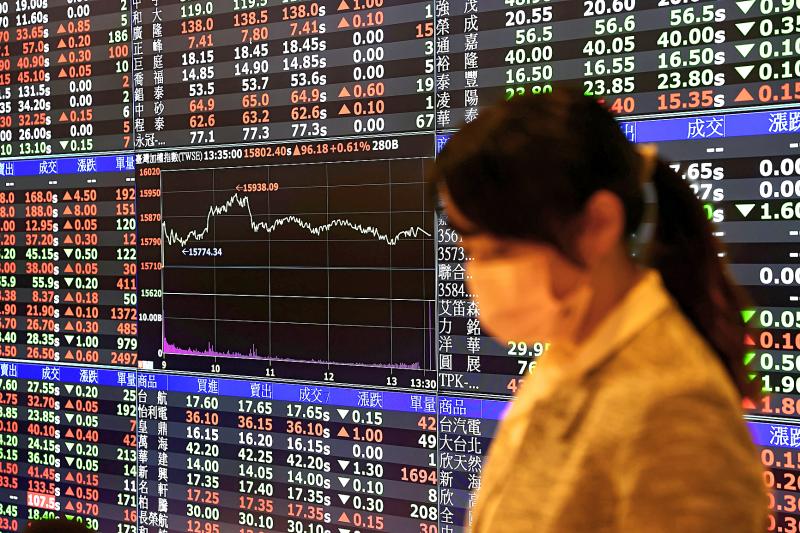Young investors aged 20 to 30 made up 33 percent of the 1.48 million new investors who opened local stock trading accounts last year, ranking first among all age groups, the Financial Supervisory Commission said yesterday.
They were followed by those aged 31 to 40, who accounted for 26.6 percent, 41 to 50 (16.7 percent), 51 to 60 (10.8 percent), 61 or older (6.7 percent) and those younger than 20 (6.1 percent), the commission said.
The number of investors who opened new trading accounts last year surged 73.6 percent from 857,657 in 2019, easily outpacing an annual gain of 28 percent the previous year, the commission said.

Photo: Ann Wang, Reuters
Investors aged 20 to 30 had for the past three years led the surge, with their weighting rising from 27.7 percent in 2018 and 29.1 percent in 2019, data from the commission showed.
“Their weighting was particularly high last year,” Securities and Futures Bureau Deputy Director-General Tsai Li-ling (蔡麗玲) told a news conference in New Taipei City.
Young investors’ rising interest in local stocks could be attributed to an increase in investors’ preference for equities over savings due to a low interest rate environment and the launch of an odd-lot trading system in late October, which enabled young players with smaller budgets to buy blue-chip stocks, the commission said.
Blue-chip stocks refer to financially sound, well-recognized companies, some of whose shares cost hundreds of thousands New Taiwan dollars if bought on the regular trading platform, where they are sold in units of 1,000 shares each.
For example, purchasing one unit of Taiwan Semiconductor Manufacturing Co (台積電) shares would cost NT$632,000, based on its closing price of NT$950 on Friday last week.
Overall, investors aged 40 or younger accounted for 65.7 percent of the new accounts, up from 60.9 percent a year earlier and 60 percent in 2018, the data showed.
By comparison, the weighting of investors older than 40 dropped to 34.3 percent last year, from 40 percent in 2018 and 39.1 percent in 2019, as the older group likely already had a few accounts in use, it said.

RECYCLE: Taiwan would aid manufacturers in refining rare earths from discarded appliances, which would fit the nation’s circular economy goals, minister Kung said Taiwan would work with the US and Japan on a proposed cooperation initiative in response to Beijing’s newly announced rare earth export curbs, Minister of Economic Affairs Kung Ming-hsin (龔明鑫) said yesterday. China last week announced new restrictions requiring companies to obtain export licenses if their products contain more than 0.1 percent of Chinese-origin rare earths by value. US Secretary of the Treasury Scott Bessent on Wednesday responded by saying that Beijing was “unreliable” in its rare earths exports, adding that the US would “neither be commanded, nor controlled” by China, several media outlets reported. Japanese Minister of Finance Katsunobu Kato yesterday also

Taiwan’s rapidly aging population is fueling a sharp increase in homes occupied solely by elderly people, a trend that is reshaping the nation’s housing market and social fabric, real-estate brokers said yesterday. About 850,000 residences were occupied by elderly people in the first quarter, including 655,000 that housed only one resident, the Ministry of the Interior said. The figures have nearly doubled from a decade earlier, Great Home Realty Co (大家房屋) said, as people aged 65 and older now make up 20.8 percent of the population. “The so-called silver tsunami represents more than just a demographic shift — it could fundamentally redefine the

China Airlines Ltd (CAL, 中華航空) said it expects peak season effects in the fourth quarter to continue to boost demand for passenger flights and cargo services, after reporting its second-highest-ever September sales on Monday. The carrier said it posted NT$15.88 billion (US$517 million) in consolidated sales last month, trailing only September last year’s NT$16.01 billion. Last month, CAL generated NT$8.77 billion from its passenger flights and NT$5.37 billion from cargo services, it said. In the first nine months of this year, the carrier posted NT$154.93 billion in cumulative sales, up 2.62 percent from a year earlier, marking the second-highest level for the January-September

‘DRAMATIC AND POSITIVE’: AI growth would be better than it previously forecast and would stay robust even if the Chinese market became inaccessible for customers, it said Taiwan Semiconductor Manufacturing Co (TSMC, 台積電) yesterday raised its full-year revenue growth outlook after posting record profit for last quarter, despite growing market concern about an artificial intelligence (AI) bubble. The company said it expects revenue to expand about 35 percent year-on-year, driven mainly by faster-than-expected demand for leading-edge chips for AI applications. The world’s biggest contract chipmaker in July projected that revenue this year would expand about 30 percent in US dollar terms. The company also slightly hiked its capital expenditure for this year to US$40 billion to US$42 billion, compared with US$38 billion to US$42 billion it set previously. “AI demand actually